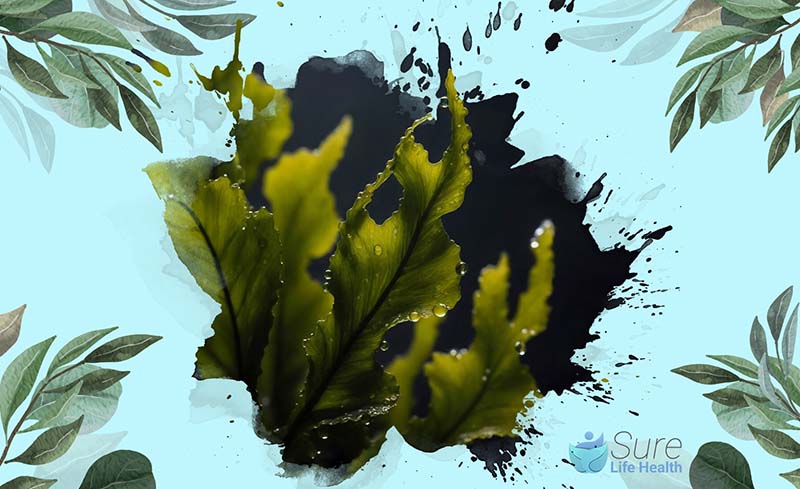Erectile dysfunction (ED) is a common issue affecting many men, especially as they get older. Over time, people have tried different treatments to deal with this problem. One of the new remedies getting attention is sea moss, a type of red algae known for being loaded with nutrients.
Sea moss is rich in essential minerals and vitamins, contributing significantly to overall health. There is growing interest in its potential benefits for sexual health, particularly regarding its impact on erectile dysfunction (ED). Researchers and those seeking natural remedies are exploring sea moss’s efficacy in this area.
Although scientific investigations are ongoing, incorporating sea moss as a supplement presents a promising approach to enhancing health, including potential improvements in ED.
Does Sea Moss Help Erectile Dysfunction?
Sea moss is claimed to offer potential benefits for Erectile Dysfunction (ED) because of its rich nutrient content.
Although there’s a lack of direct scientific studies confirming sea moss as a remedy for ED, it contains essential nutrients such as zinc, iron, and iodine. These nutrients play a vital role in maintaining overall health and could potentially support sexual health.
Sea moss might help boost libido, improve blood circulation, enhance sperm quality, and regulate hormonal balance, all of which could indirectly improve erectile function.

Scientific Research on Sea Moss and Erectile Dysfunction
Several scientific studies have begun to scrutinize the benefits of sea moss in managing erectile dysfunction (ED), though findings so far are a mix of personal experiences and outdated research. Sea moss is rich in iodine, essential for thyroid health, which can also affect sexual function. However, we still need more research to clearly understand how sea moss might improve erectile function.
Research has focused on sea moss’s nutritional benefits, especially its high levels of zinc and magnesium, which are key for hormone regulation and blood flow. These nutrients could indirectly benefit erectile health. A study on natural ED solutions pointed out sea moss’s nutrient-rich profile, suggesting it could help with erectile function by improving nutrient absorption and blood circulation.
Yet, there’s not enough clinical evidence to directly link sea moss with ED treatment. More studies are needed to confirm its effectiveness and to figure out the right dosages and safety.
For now, researchers stress that the research on sea moss and ED is still in its early stages. Those experiencing ED should talk to healthcare professionals about proven treatments. Sea moss could be considered as a supplement to these treatments, but it should be used carefully and with medical advice, considering the ongoing research into its benefits and safety for sexual health.
How Does Sea Moss Help With Sexual Desire?
Many individuals struggle with a decreased sex drive, impacting their quality of life and overall well-being. Numerous factors contribute to this issue, including stress, mental health conditions, and irregular hormone levels.
Fortunately, sea moss offers a natural solution to many of these underlying problems, potentially enhancing sexual desire. Here are three ways sea moss can help increase libido:
Sea Moss Contains a lot of Iron
Sea moss is rich in iron, a crucial nutrient for overall blood circulation. Proper blood flow to the sexual organs is essential for arousal and sexual function.
Insufficient blood circulation can contribute to erectile dysfunction, a common issue among men. By improving blood flow, sea moss can serve as a natural remedy for erectile dysfunction, supporting normal sexual functions and potentially increasing libido.
Sea Moss Helps Regulate Thyroid Function
Sea moss is an excellent source of iodine, which plays a vital role in regulating thyroid function. Hypothyroidism, characterized by insufficient thyroid hormone production, can lead to a decreased sex drive due to hormonal imbalances.
Sea moss’s ability to regulate thyroid hormones can help combat hypothyroidism, thereby alleviating symptoms of low libido and increasing sexual arousal.
Sea Moss Helps Avoid Fatigue
Fatigue and low energy levels are common contributors to a decreased sex drive. Engaging in sexual activities requires physical stamina, which can be compromised if the body feels constantly tired.
Sea moss offers significant nutritional value, helping to combat fatigue and provide the energy needed for sexual activities. Incorporating sea moss into your diet can provide a natural energy boost, supporting a healthy sex drive without relying on artificial stimulants like energy drinks.
In summary, sea moss offers a natural and holistic approach to addressing factors that contribute to low libido. By boosting iron levels, regulating thyroid function, and combating fatigue, sea moss can help improve sexual desire and overall sexual health.

9 Other Benefits of Sea Moss
Sea moss is renowned for its health benefits due to its rich content of vitamins, minerals, and antioxidants. Here are nine additional benefits of sea moss, along with brief explanations:
Enhances Mental Health
Sea moss is high in potassium, vital for a healthy nervous system. Potassium helps regulate mood and lower stress levels, potentially enhancing overall mental health and well-being.
Strengthens the Immune System
Packed with iron and antioxidants, sea moss can fortify the immune system. Antioxidants combat free radicals and oxidative stress, while iron supports red blood cell production, bolstering the body’s ability to fight infections.
Supports Prostate Health
Sea moss contains essential nutrients like zinc, beneficial for prostate health and maintaining its function.
Helps Fight Bacteria
With natural antibacterial and antiviral properties, sea moss can combat infections. Its bioactive compounds may inhibit the growth of bacteria and viruses, reducing infection risks.
Helps Hair Grow
Nutrients in sea moss, such as iron and vitamins, are believed to stimulate hair growth and contribute to healthier hair.
Supports Digestive Health
Sea moss is a good fiber source, aiding digestion and promoting gut health. Fiber maintains regular bowel movements, prevents constipation, and supports a healthy gut microbiome.
Increases Energy Levels
Rich in iron, sea moss plays a key role in energy production within the body. Iron optimizes oxygen transport to cells, vital for energy production and combating fatigue.
Promotes Healthy Skin
Sea moss’s high sulfur content benefits skin health. Sulfur aids collagen production, reduces inflammation, and fights acne, resulting in healthier, smoother skin.
Improves Cardiovascular Health
Potassium in sea moss helps manage blood pressure levels, reducing hypertension risks. Its antioxidants may also lower bad cholesterol levels, further enhancing heart health.
Instructions for Using Sea Moss Effectively
To begin incorporating sea moss gel into your diet, it’s best to start with a conservative amount. Begin by taking 1-2 tablespoons of sea moss gel daily. This
starting dose allows your body to adjust to the new supplement and helps you monitor how your body responds.
If you find that your body tolerates the sea moss gel well, without any adverse reactions, you can consider increasing your intake. It’s important to do this slowly and mindfully.
Gradually increase the amount, ensuring you do not consume more than 4 tablespoons per day. This cautious approach allows you to maximize the benefits of sea moss gel while minimizing any potential discomfort or side effects.
How to Prepare Sea Moss
Ingredients:
- Raw sea moss
- Water
Step 1: Wash the Sea Moss
Begin by rinsing the raw sea moss under running water to remove any dirt or unwanted particles.
Step 2: Soak
Put the cleaned sea moss into a big bowl and cover it with water. Leave it to soak for 12 to 24 hours. This step is crucial as it helps the sea moss to expand and become softer, preparing it for blending.
Step 3: Blend
Once it has soaked, drain off the water and place the sea moss in a blender. Add just enough fresh water to cover the sea moss. Blend it until you get a smooth, gel-like texture.
Step 4: Store
Transfer the blended sea moss gel into a clean, glass jar and keep it in the refrigerator. It should stay fresh for up to three weeks.
Reasonable Dosage When Using Sea Moss
To begin incorporating sea moss gel into your diet, it’s best to start with a conservative amount. Begin by taking 1-2 tablespoons of sea moss gel daily. This starting dose allows your body to adjust to the new supplement and helps you monitor how your body responds.
If you find that your body tolerates the sea moss gel well, without any adverse reactions, you can consider increasing your intake. It’s important to do this slowly and mindfully.
Gradually increase the amount, ensuring you do not consume more than 4 tablespoons per day. This cautious approach allows you to maximize the benefits of sea moss gel while minimizing any potential discomfort or side effects.
Conclusion
In conclusion, sea moss offers a plethora of vitamins, minerals, and antioxidants that hold potential benefits for overall health. However, it’s important to note that the nutritional composition of sea moss can vary, and consuming large amounts may lead to high levels of iodine or heavy metals.
While some benefits of sea moss seem promising based on studies of seaweed and sea algae, further research is needed to fully understand its health effects in humans and determine its efficacy in consumer health products. Scientists must conduct more studies to delve deeper into the potential advantages and risks associated with sea moss consumption.
In the meantime, incorporating sea moss into your diet in moderation and under the guidance of healthcare professionals may offer potential health benefits. As research progresses, we can better comprehend the role of sea moss in promoting overall well-being and its potential applications in consumer health products.
Be sure to explore more insightful blogs from Sure Life Health, where we continue to shed light on the latest trends and breakthroughs in health and wellness.
Professor Gaye Cunnane, PhD, MB, FRCPI
As the Director of Health and Wellbeing at RCPI, Professor Gaye Cunnane is at the helm of initiatives aimed at enhancing the health and well-being of RCPI Trainers and Trainees. Her role extends beyond administration; she is also a respected clinical professor of rheumatology and a consultant rheumatologist at Trinity College Dublin (TCD) and St James’s Hospital. Prof. Cunnane’s medical journey began at TCD, where she graduated from medical school, and her path has been marked by both clinical and academic excellence.
After completing her basic clinical training in medicine, she embarked on PhD studies at University College Dublin and St Vincent’s University Hospital. Her research during this period was focused on prognostic markers in early inflammatory arthritis, a project that saw her collaborating with esteemed universities across Europe, including in Switzerland, The Netherlands, the UK, and Sweden.
Prof. Cunnane’s career took her to the University of California, San Francisco, where she spent three years delving into research on new treatments for lupus. Her academic prowess led her to the University of Leeds in 2001 as a senior lecturer, before returning to Ireland in 2003 to assume her current roles. She has also served as the National Specialty Director for Rheumatology training in Ireland, Programme Director for Basic Specialist Training with RCPI, and as a past President of the Irish Society for Rheumatology.
PUBLISHED ARTICLES
“Rheumatic disease differentiation using immunoglobulin G sugar printing by high-density electrophoresis”: Published in The Journal of Rheumatology, this study reflects her in-depth investigation into rheumatic diseases.
“Benefits of exercise in patients with rheumatoid arthritis: a randomized controlled trial”: This research work, highlighting the positive impact of exercise on rheumatoid arthritis, underscores Prof. Cunnane’s dedication to practical, patient-centered research.
Additionally, Prof. Cunnane has made notable contributions to the Annals of the Rheumatic Diseases, discussing early referral, diagnosis, and treatment of rheumatoid arthritis. She has also been involved in a study on the NCBI platform investigating exercise benefits in rheumatoid arthritis patients.
Professor Gaye Cunnane’s career is a testament to her commitment to improving patient outcomes in rheumatology through rigorous research, clinical excellence, and dedicated teaching. Her work continues to influence the field of rheumatology, both in Ireland and internationally.

